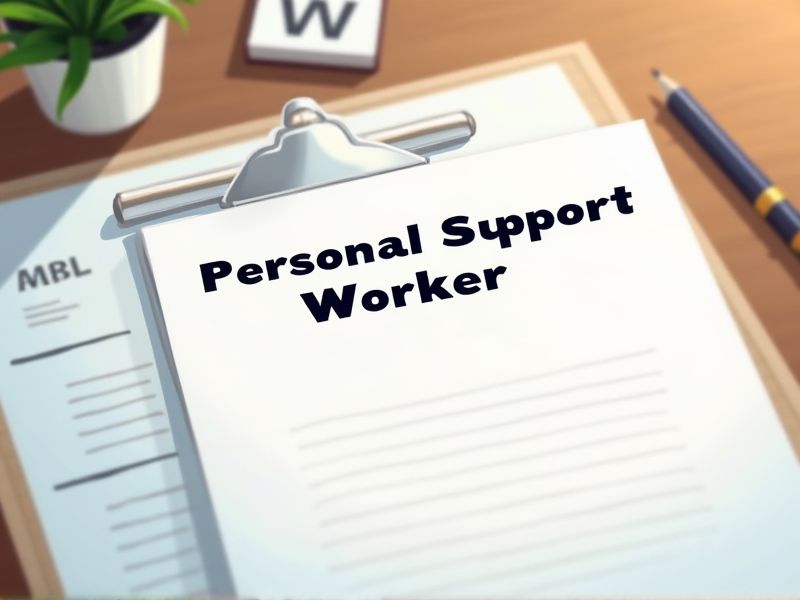
Personal Support Workers are critical in providing care to individuals with health and mobility challenges, creating a demand for well-trained professionals. Certifications validate a PSW's skills and ensure they can meet high standards of safety and care. Having specific certifications equips workers with necessary expertise to handle diverse situations, promoting trust with clients and families. Here are some essential certifications required for a Personal Support Worker.
Personal Support Worker Certification
Having a Personal Support Worker (PSW) Certification ensures that individuals possess the necessary skills and knowledge to provide quality care to clients. Certification often leads to increased trust from families and employers, resulting in better job opportunities. Mandatory training included in the certification process equips workers to address complex client needs efficiently. Government regulations and healthcare industry standards generally require this certification for legal compliance and professionalism.
CPR and First Aid Certification
Having CPR and First Aid Certification equips a Personal Support Worker (PSW) with essential life-saving skills, increasing the potential for immediate and effective response to emergencies. This certification helps build trust with clients and families, reinforcing confidence in the PSW's ability to handle health crises. Employers often require this certification as a standard prerequisite, reinforcing the professional competence and preparedness of their staff. Knowing CPR and First Aid can significantly improve outcomes during critical incidents, leading to better overall health and safety for clients.
Basic Life Support (BLS) Certification
Basic Life Support (BLS) certification equips personal support workers with essential skills to handle medical emergencies, such as cardiac arrest, which directly increases patient survival rates. Training in BLS ensures that support workers can promptly and effectively administer CPR or use automated external defibrillators (AEDs) when necessary, reducing the time before professional medical care arrives. This certification also fosters a safer environment for both patients and support workers by enhancing overall emergency preparedness. Employers often require BLS certification as it demonstrates a worker's capability to respond properly in critical situations, ensuring a higher standard of care.
Infection Control and Prevention Certification
Infection Control and Prevention Certification equips Personal Support Workers with essential knowledge to minimize the spread of infections, safeguarding both clients and themselves. As healthcare environments expose workers to various pathogens, certification ensures adherence to key hygiene and prevention protocols. The certification demonstrates a commitment to maintaining high standards of care, reflecting positively on the employing organization. Compliance with infection control measures can reduce healthcare-associated infections, leading to improved patient outcomes and decreased healthcare costs.
Medication Administration Certification
Being medication administration certified equips personal support workers (PSWs) with the skills to safely manage and dispense medications, reducing the risk of errors. Certification ensures PSWs understand critical protocols and legal responsibilities, which are crucial for maintaining patient safety and compliance with healthcare regulations. It enhances the PSW's ability to support and monitor patient health effectively, increasing trust and communication with other healthcare team members. Certification can also lead to expanded job opportunities and career advancement within the healthcare field.
Manual Handling and Mobility Certification
Adequate manual handling and mobility certification equips personal support workers with the skills to prevent injuries during patient lifting or movement. Training enhances their understanding of body mechanics, reducing the risk of musculoskeletal disorders. Certified workers are better prepared to ensure patient safety and comfort during mobility tasks. Certification fosters a reliable standard of care, ensuring compliance with regulatory health and safety guidelines.
Dementia Care Certification
Dementia Care Certification equips Personal Support Workers (PSWs) with essential skills to address the complex needs of individuals with dementia, enhancing care quality. Statistics show that dementia cases are rising globally, necessitating specialized training for effective management. Certification provides PSWs with up-to-date knowledge on dementia care, often resulting in better outcomes for patients. Healthcare facilities can improve their reputation and trust among clients when their staff is certified in dementia care.
Palliative Care Certification
Palliative Care Certification provides personal support workers with specialized knowledge and skills to effectively manage symptoms and improve the quality of life for patients with serious illnesses. This certification ensures that personal support workers can offer compassionate and culturally sensitive support, meeting the unique needs of both patients and their families. Demonstrating competence in palliative care enhances the credibility and professionalism of personal support workers, leading to better employment opportunities and career advancement. With an aging population, the demand for palliative care is increasing, making this certification essential for addressing the healthcare system's evolving needs.
Mental Health First Aid Certification
Mental Health First Aid Certification equips Personal Support Workers with essential skills to identify and address mental health crises, ensuring timely intervention. This certification leads to improved care quality, as workers become adept at recognizing symptoms and providing appropriate support. Understanding mental health challenges reduces stigma, fostering a more supportive environment for both staff and clients. Effective management of mental health situations minimizes incidents and promotes overall well-being, enhancing job satisfaction and client outcomes.
Communication in Healthcare Certification
Improved communication skills through certification can reduce misunderstandings between personal support workers and patients, leading to better patient outcomes. Certified communication skills help in accurately conveying and understanding patient needs, which enhances the quality of care provided. Health care settings are diverse, and certified workers are better equipped to navigate cultural and language differences effectively. Training in communication fosters a more cohesive work environment, reducing stress and increasing job satisfaction among support staff.
Summary
When you, as a Personal Support Worker, obtain additional certifications, you improve your skill set and knowledge base. This enhancement can lead to better job opportunities and potentially higher pay. Employers often value certified workers more, which can increase job stability for you. Certification might also elevate the quality of care you provide, benefiting your clients.
